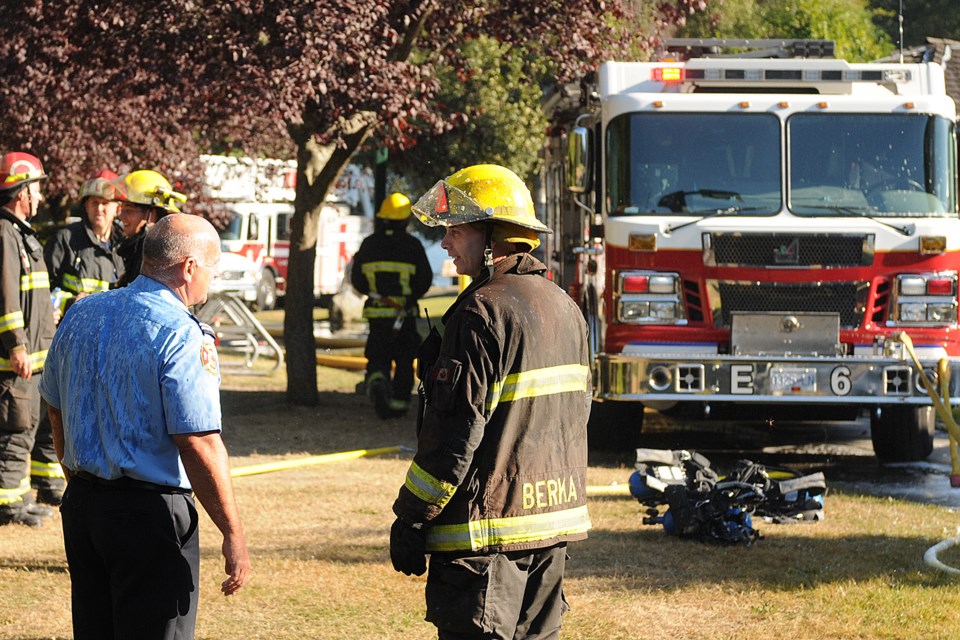Stunned, shocked and appalled were some of the words city councillors used Tuesday to describe a situation unfolding in the city that has left injured and sick citizens waiting up to two hours for an ambulance.
Some of those citizens have included a senior with cuts to the head after a fall (49 minutes), a 54-year-old man in respiratory distress (27 minutes) and a teenager with a serious stomach injury (50 minutes).
“This is just blowing my mind that this happens in a developed country,” said Vision Coun. Tony Tang after hearing Fire Chief John McKearney deliver a damning presentation on the impact recent changes have had since B.C. Emergency Health Services decided in October to downgrade 39 types of calls to routine that were once classified as emergency.
The result is firefighters, who are not as highly trained as paramedics and not allowed to transport patients to hospital, are responding to calls such as falls, assaults and motor vehicle accidents and waiting an average of 21 minutes for an ambulance to arrive.
“The longer that we have to wait and attend to a patient, the more likelihood there is that we may need to do an intervention for which our firefighters don't have the skills and are not licensed,” said city manager Penny Ballem, a trained medical doctor. “By leaving us handling that gap in time, we're by default starting to take on risk and a responsibility to probably have to do something and that is nothing other than a download.”
McKearney used graphs to show that 90 days prior to the change, the average response times for firefighters was six minutes, 21 seconds and paramedics was 12 minutes, 44 seconds.
Three months after the change, average response times for firefighters increased to eight minutes, 9 seconds. The average response time for paramedics was 34 minutes, five seconds.
“I fail to understand why they are causing grief to our mayor and councils across Metro Vancouver and across the province — and to our citizens —when it's really within their purview to sit down and come up with a constructed concept of service,” said McKearney, whose presentation prompted a series of questions from councillors on risks to citizens and the potential impact on the city's budget.
“We've heard it from Coun. Meggs that he's shocked, Coun. Jang says it's unbelievable and I'm actually appalled,” said Vision Coun. Raymond Louie, who supported Mayor Gregor Robertson's motion to write to Health Minister Terry Lake and the board that oversees B.C. Emergency Health Services to express council's concerns.
Dr. William Dick, vice-president of medical programs for B.C. Emergency and Health Services, disputed the fire chief's assessment of response times for ambulances.
In a conference call with reporters after the council meeting, Dick said his team of analysts examined 84,000 calls since the change and learned paramedics responded to “our sickest patients provincially” about one minute faster. Fewer sick patients waited an average of six minutes longer for an ambulance, he added.
When asked to explain the discrepancy between his data and statistics supplied by McKearney, Dick said he hadn't seen the numbers from the fire department.
“I know that my data is correct,” he said.
Dick said the rationale for downgrading 39 emergency calls to routine was not based on costs, but on providing better patient care and not to “over-respond to calls.”
“If you call for an ambulance, you're going to get an ambulance - it's just how we drive to some calls,” he said, noting the downgrade will mean 800,000 fewer kilometres driven by paramedics to emergencies. “We want to provide the best patient care we can on each and every call and we want to make sure that our resources are being used effectively.”
Dick acknowledged there are cases where patients are waiting a long time for an ambulance to arrive. McKearney also noted there are cases where bystanders transport a person to hospital instead of waiting for paramedics to arrive.
“I don't like the thought of somebody waiting on a sidewalk with a cut on their hand or who's banged their head or somebody with a broken hip who's waited 40 minutes for an ambulance to get there,” he said. “It's not something I like to see but those are extreme outlier cases.”
Dick encouraged McKearney and other fire chiefs to continue to send him cases of concern for his team to examine.
“I'm trying to be as transparent as I possibly can and to take the criticism and concerns from first responder groups and municipalities and work to try and fine-tune the system to make it better for every person in this province,” he said.
Dick questioned the need for firefighters to attend certain calls such as a person with minor abdominal pain or “minor traumatic injuries.”
“It's not my call to make but it's up to each city council to decide how they want to spend taxpayers' dollars and whether they want to send first responders to calls where they're not necessary,” he said.
Asked by one reporter whether city council was being “alarmist” in their comments, Dick replied that he had a good working relationship with McKearney and welcomed Ballem's input.
“I'm not going to be so strongly worded to say it's alarmist but you can take what you want from that,” he said, adding that he's confident the change to calls is working for the betterment of patients.
mhowell@vancourier.com
twitter.com/Howellings



